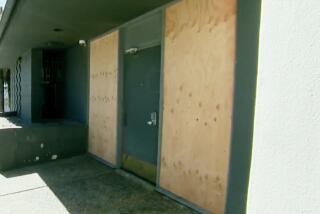CalBank may foreclose on Corona synagogue
Facing the same dire fate as thousands of homeowners in the recession-flattened Inland Empire, a synagogue in Corona is battling a local bank to stave off foreclosure.
Congregation Beth Shalom built a $1.4-million house of worship at the top of the real estate market in 2008, only to see income from donations plummet as regional unemployment soared.
“No question, we took a hit on the amount of money coming in. We built at the worst possible time, like a lot of people around here,” said congregation President Bruce Williams. “We need some help getting our loan modified. But rather than sitting down with us, the bank wants to foreclose. It’s mind-boggling.”
Members of interfaith coalitions in Corona and Riverside will join synagogue leaders Tuesday for protest outside a local branch of the bank seeking the foreclosure, San Diego-based California Bank and Trust, known as CalBank. Williams hopes the rally will pressure the bank to renegotiate.
“If they can do this to us, they can do it to a Catholic church, or a Methodist church or a Protestant church. No one is safe,” said Williams, whose children and grandchildren also attend the synagogue.
Esmael Adibi, director of Chapman University’s A. Gary Anderson Center for Economic Research, said he wasn’t surprised to see a religious institution falling on hard financial times, especially in the Inland Empire, where unemployment hovers about 12%. Many businesses, including hotels, have experienced the same fate.
“You usually don’t hear about [religious institutions] because relatively speaking there’s not many compared to people losing their homes,” Adibi said. “But churches get into trouble. Just look what happened to the Crystal Cathedral in Orange County.” The cathedral was sold in a bankruptcy proceeding late last year to the Roman Catholic Diocese of Orange.
In 2011, Riverside and San Bernardino counties had the fifth-highest foreclosure rate among metropolitan areas nationwide at 5.16%, according to RealtyTrac, which monitors foreclosure properties. More than 75,500 homes and business properties in the two counties received a notice of foreclosure.
The original loan for the 4,400-square-foot synagogue, which includes classrooms and other facilities on California Avenue in south Corona, came from Rancho Cucamonga-based Vineyard Bank, which was seized by federal regulators in 2009 and later acquired by CalBank.
CalBank officials said privacy laws prohibit them from discussing the details of the loan but said the bank “does everything it can to reach a mutually beneficial outcome” with borrowers in financial distress.
“In general, foreclosures occur when borrowers are in default of their loan agreement, their loan is secured by real estate and the borrower and lender are unable to agree to modifications or restructures of the loan acceptable to both parties,” Steven Borg, a senior vice president, said in a statement.
Williams said CalBank has refused to renegotiate because the loan is insured by the Federal Deposit Insurance Corp. CalBank stands to collect roughly 80% of the loan’s value from the federal government, sapping any incentive to remodify to loan, he said. Bank officials dispute that.
Congregation Beth Shalom declared bankruptcy last summer. The synagogue has cash on hand to pay its bills, teachers and staff — but not the mortgage, Williams said.
“We’re still functioning except with this situation with the bank. They’ve just been relentless,” he said.
More to Read
Sign up for Essential California
The most important California stories and recommendations in your inbox every morning.
You may occasionally receive promotional content from the Los Angeles Times.











